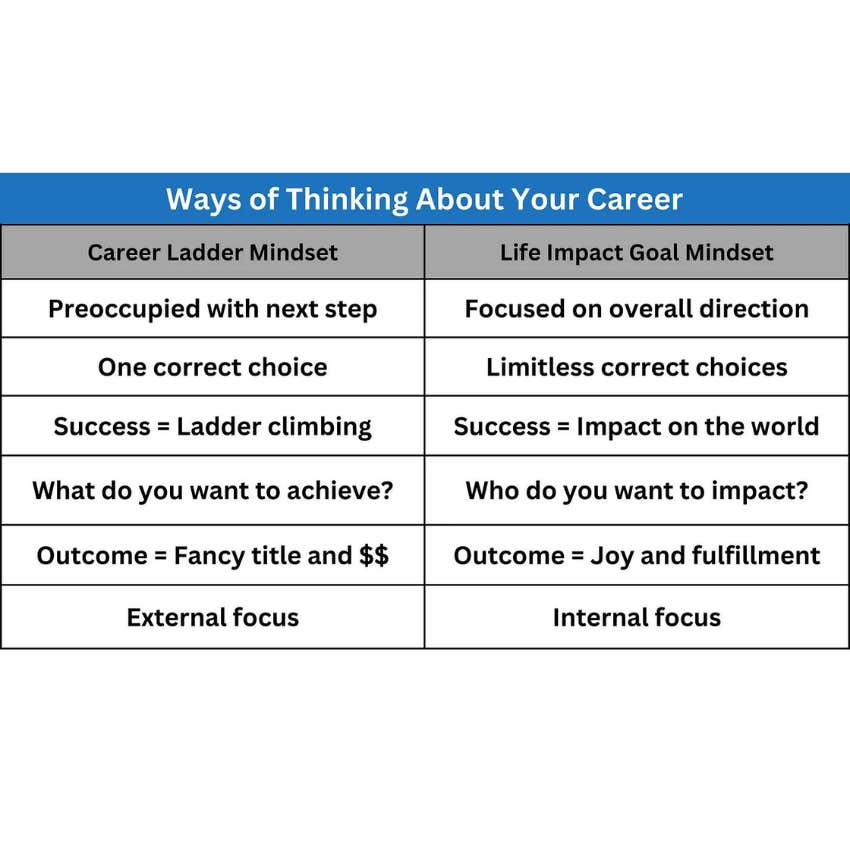The Best Career Move I Ever Made Was 5 Steps Backward On The Corporate Ladder
Think of your career as a climbing wall, not a ladder.
 Polinach | Canva
Polinach | Canva Six years ago, I made what some people would call the dumbest career move a person could make. I left a job as Director of Client Services at an international SaaS company and became a Business Analyst at a credit card processing firm.
Depending on how you count it, the move represented about five steps backward on the corporate ladder. And yet, it’s the best career move I ever made.
When I interviewed at the credit card processing firm, the CEO and Chief of Staff told me the company customarily didn’t hire people into senior roles. They brought senior people into low-level positions so they could learn the business, and then they had to prove themselves and earn a top spot. They asked me what I ideally wanted to do, and I explained that in my last role, I had realized that I wasn’t passionate about Customer Service (CS). I was passionate about people development.
In my CS role, I had found myself spending a disproportionate amount of time on learning & development (L&D) initiatives such as new hire onboarding and manager training. It took me a long time to realize that actual L&D roles existed that would enable me to spend nearly 100 percent of my time working on my areas of passion: training, mentoring, and developing people. And as soon as I realized that, I knew I had to jump ship and find a track that could get me into L&D.
So in these interviews with the CEO and Chief of Staff, they said they’d love to hire me as a Business Analyst and see if I could prove myself. If I could, there was a chance that six to twelve months later, I may find myself running L&D. I left that interview with my head in a tizzy.
For years, I had been laser-focused on career progression. I had set personal goals of what title I wanted to attain by what age. To me, there was nothing more important than getting the affirmation (and ego boost) of climbing the next rung on the corporate ladder. And after a long slog up the ladder, I landed a Director role. The idea of falling to the bottom of the ladder sounded not only scary but absurd. Why would I do that?
And yet, the more I thought about it, I questioned whether my outsized ambitions were serving me well. It began to feel like the only reason I was clinging to my current rung on the ladder was because of my ego, which didn’t feel like a good reason.
To resolve this dilemma, I did what I normally do in these situations: I sought out one of my mentors, Phil. A couple of days later, I sat down with Phil at a local coffee shop and asked him, “I’ve worked so hard to get to this point in my career. I shouldn’t move that far backward, should I?”
Quick background on Phil: he’s one of those guys who knows how to cut through BS while still being supportive (which makes him an incredible mentor).
Phil’s response set me straight: “Bobby, it seems pretty silly to make a decision just based on a job title. Titles don’t mean anything. Do you think this new role would be a step toward something more fulfilling?”
In a few sentences, Phil cut to the core of the situation. It was indeed painful to swallow my ego and post my new “Business Analyst” role on LinkedIn a few weeks later, but I made the leap and it put me on my most fulfilling career path yet.
Six months later, I was allowed to create a new role at that company as the Head of L&D, and I’ve been in L&D roles ever since. In the years after, I’ve talked to countless friends and business leaders who are every bit as hung up on titles as I was. It seems many of us have given in to the implicit propaganda that says we need to climb hand-over-hand up a ladder someone else decided was important.
“It’s as if from an early age there is always someone pointing to a ladder and telling us to climb. And so we do. Only to find ourselves in a new space with someone new telling us that this is the ladder to climb here. And some of us, we got really good at climbing ladders…Which brings us to the problem with ladders: Very few of us ever took a class that taught us how to know: Is this ladder even leaning up against the right building?” — Rob Bell
I’m now convinced there’s a better way: a path of fulfillment for all of us. Just like anything else that’s real and true in the world, there’s no easy formula or standard solution that works for everyone. Each person has to figure out the path that’s most meaningful for them.
But it’s time we stopped thinking of career progression in terms of ladders and started thinking of it in terms of climbing walls.
 Photo: Dragon Images / Shutterstock
Photo: Dragon Images / Shutterstock
Ladders are bidirectional. You’re either moving up (“good”) or down (“bad”).
Climbing walls allow freer movement. Sometimes the best way to scale a wall is actually to move sideways to grab a handhold that can propel you in a new direction. At other times, you need to move down the wall to get around an obstacle or find a new path. On a climbing wall, any direction can be the right move to eventually reach your desired outcome.
A related mistake people make is thinking of career goals in terms of a specific title they want to achieve. For example, my 27-year-old self wanted to become a Director by the time I was 30, and then become a Chief Executive when I was in my 40s. The title was my focus. But if I stopped to think about why I was so focused on titles, the honest answer would have been reasons like status, money, and power. We could argue about whether those things are good or bad, but I think we can agree that they’re not always correlated with happiness and fulfillment.
There’s a better way to frame career goals. Rather than focusing on titles, you can focus on the impact you want to have on your life. When I viewed careers as ladders, my career thoughts were focused on the question, “What title do I want to achieve and by when?” But that is a crappy question. It doesn’t address any of the meaningful aspects of life, such as:
- Whether my work is improving the world
- Whether my work is helping others
- Whether my work is bringing me joy and fulfillment
A much better introspective career question is, “What impact do I want to have on the world?” This question can be framed in many different ways:
- “How do I want the world to be different as a result of my time here?”
- “What path will bring me the most joy?”
- “What am I uniquely able to do that others can’t?”
- “If I accomplished one goal in my life and nothing else, which goal would enable me to feel like my life had been a success?”
Any of these questions leads to a more meaningful answer than any question about titles or positions.
I started to ask myself these questions six years ago when I made that massive career transition. Over time, an answer crystallized which has been a driving force in my life ever since: My mission is to help others develop into better leaders, learners, and communicators.
That’s my Life Impact Goal. If I can accomplish that, my life will have been a success, and I’ll be able to hold my head high knowing I helped others while also finding joy in my work.
 Image by author
Image by author
Around the same time I began wrestling with these questions, I met up with a college student and friend named Shaun whom I had been mentoring. Shaun is a highly capable guy who was trying to decide between three very different career paths:
- Enroll in a graduate school program in China
- Accept an internship with a U.S. company (he already had the job offer)
- Go back to his home country of South Africa and start a business
Shaun had lost sleep over these three options, convinced that if he chose the wrong path, it would set him back in his career. I shared my career journey with Shaun, and we talked about some of the Life Impact Goal questions I had begun wrestling with. I asked Shaun to define what “success” meant to him. We briefly talked about money and maintaining close friendships, and then he said, “I want to find a way to help South Africa by bringing more resources or jobs to them.” That was it. Shaun had landed on a Life Impact Goal.
So we analyzed each of the paths he was considering in terms of which would help him achieve his goal:
- The grad school program would give him international business skills that would make him more knowledgeable when he eventually went back to South Africa (which he planned to do).
- The U.S. internship would teach him how to run business operations, and he could use those skills to find a company, nonprofit, or NGO back home.
- The business he started in South Africa could help the community and eventually create jobs.
As Shaun evaluated the three options, he realized that any one of those paths could ultimately help him attain his Life Impact Goal. Path #3 was a more immediate and direct connection to his goal, but paths #1 and #2 could be even more fruitful because they’d teach him valuable skills to draw upon later when he returned to South Africa. When Shaun came to this realization, he breathed a sigh of relief. He realized he didn’t need to stress out about his next step. There were at least three marked routes up the climbing wall. Each potential opportunity was a step forward, and that was all that mattered.
This conversation with Shaun was also a key moment for me. I realized there were countless ways to achieve my Life Impact Goal of developing leaders, learners, and communicators:
- I could work in L&D and create training programs for young leaders.
- I could become a college professor and train the next generation of students.
- I could become a leadership author and speaker, writing books for future leaders.
The role or title didn’t matter much. What mattered was whether I was charting a route (any route) that led up my climbing wall.
Now I turn my focus to you. I’m guessing you’ve probably given in to the classic American dream goal of placing one hand in front of the other to ascend a ladder someone else told you was important. You may not even know why you’re doing it. Maybe it’s because that’s what a parent or professor told you to do. Maybe you think it’s the best way to earn more money or status. Or maybe it’s because climbing this ladder feels normal because that’s what everyone else around you is doing.
Regardless of the reason, I encourage you to ask yourself whether the goodies at the top of that ladder will make you happy. Just like me, you’ve probably read countless memoirs and watched countless documentaries about people who “had it all” and felt empty inside. Status and money can only do so much, and many of the people who’ve accumulated oodles of status and millions of dollars find themselves wishing they had less stress, more time with loved ones, and more meaning in their lives.
“The final estimate of men shows that history cares not an iota for the rank or title a man has borne, or the office he has held, but only the quality of his deeds and the character of his mind and heart.” — Samuel Brengle
So if you’re beginning to question this whole career ladder thing, do three things for me:
- Don’t focus on the job title you want. Instead ask yourself, “What impact do I want to have on the world?”
- Use the answer to that question to define the top of your climbing wall, then find a path (up, down, or sideways) to scale that wall to true fulfillment.
- If you discover a job opportunity that will move you closer toward your Life Impact Goal, go for it. The exact step you take matters less than the direction you’re stepping.
When you’re buried in the ground someday, no one’s going to care whether your job title is “Analyst,” “Director,” or “Executive.” Only two things in life matter: That you enjoy what you do and that you positively impact the lives of others.
Bobby Powers has spent the past decade managing teams and training managers. He currently serves as Director of Learning & Development at Jitasa. His articles about leadership, personal development, and communication have been published in over a dozen publications.

